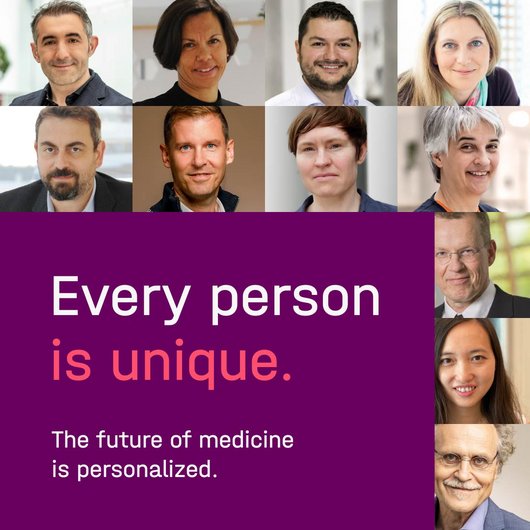
Personalized Medicine
Personalized medicine represents the future of healthcare. Therapies customized to individual patients hold the promise of exceptional effectiveness. At Helmholtz Munich, we are investigating the scientific fundamentals that will shape the medicine of tomorrow. From deciphering risk genes associated with conditions such as diabetes or cancer to analyzing the impacts of lifestyle and environment, and even predicting individual responses to medications: Through our basic research, driven by artificial intelligence and bioengineering, we are paving the way for tailored interventions.
Personalized medicine represents the future of healthcare. Therapies customized to individual patients hold the promise of exceptional effectiveness. At Helmholtz Munich, we are currently investigating the scientific fundamentals that will shape the medicine of tomorrow. From deciphering risk genes associated with conditions such as diabetes or cancer to analyzing the impacts of lifestyle and environment, and even predicting individual responses to medications: Through our basic research, driven by artificial intelligence and bioengineering, we are paving the way for tailored interventions.
Hot Topics
Scientists at Helmholtz Munich are actively participating in the Human Cell Atlas (HCA) project, focusing specifically on one of the largest organs, the lung. Given its significant importance due to the global prevalence of lung diseases as a major cause of morbidity and mortality, the lung serves as a flagship project within the HCA.
In 2017, Prof. Fabian Theis, Prof. Herbert Schiller, and their teams of highly skilled scientists were amongst the first to study human lungs using single-cell technologies. Through collaborative efforts across the whole HCA network, an integrated Human Lung Cell Atlas (HLCA) was presented six years later in 2023, making it the first comprehensive atlas of a major organ within the HCA – an impressive milestone in the HCA project.
Given the global impact on hundreds of millions of individuals, the identification and comprehension of genetic risk factors for type 2 diabetes hold particular significance. An international consortium, co-led by Prof. Eleftheria Zeggini, has recently published the largest type 2 diabetes genome-wide association study. Our research has revealed over 600 genetic risk loci, facilitating the development of risk scores for diabetes complications.
Understanding the risk of complications in type 2 diabetes is pivotal for taking early actions to mitigate its effects. Our objective is to slow down or even prevent the onset of these debilitating medical issues, ultimately enhancing patient outcomes and quality of life.
Helmholtz Munich researchers have pioneered a novel method for evaluating skin microvascular changes associated with diabetes severity. Through the integration of artificial intelligence (AI) with cutting-edge optoacoustic imaging, we precisely measure these changes, revealing valuable insights into the progression of diabetes.
This breakthrough led by Prof. Vasilis Ntziachristos could revolutionize diabetes monitoring, offering a deeper understanding of its systemic effects. The technology employs a non-invasive skin scanner capturing blood vessel images, with AI analyzing vascular patterns. This innovation holds the potential for early detection and personalized treatment strategies. Leveraging advanced imaging and AI, we strive to enhance diabetes management for better patient outcomes.
Read Research News: Examining Diabetes with a Skin Scanner and AI
The ability to reprogram cells holds great promises for regenerative medicine. Cells from the embryo at the beginning of life divide and produce all cell types in the body. What can embryos teach us so that we can generate cells ‘à la carte’ to cure injuries and degenerative diseases such as Alzheimer’s?
At Helmholtz Munich, researchers led by Prof. Maria-Elena Torres-Padilla combine high-resolution microscopy with single-cell genomics to study the epigenetic principles underlying cellular reprogramming.
Scientists at Helmholtz Munich led by Dr. Ali Ertürk have developed wildDISCO, a revolutionary technique for creating high-resolution 3D maps of entire bodies. This groundbreaking method uses standard antibodies to reveal details of complex biological systems and diseases. WildDISCO has the potential to transform our understanding of intricate processes in health and disease and paves the way for exciting advancements in medical research.
Read Press Release: WildDISCO: Visualizing Whole Bodies in Unprecedented Detail
Scientists at Helmholtz Munich are actively participating in the Human Cell Atlas (HCA) project, focusing specifically on one of the largest organs, the lung. Given its significant importance due to the global prevalence of lung diseases as a major cause of morbidity and mortality, the lung serves as a flagship project within the HCA.
In 2017, Prof. Fabian Theis, Prof. Herbert Schiller, and their teams of highly skilled scientists were amongst the first to study human lungs using single-cell technologies. Through collaborative efforts across the whole HCA network, an integrated Human Lung Cell Atlas (HLCA) was presented six years later in 2023, making it the first comprehensive atlas of a major organ within the HCA – an impressive milestone in the HCA project.
Given the global impact on hundreds of millions of individuals, the identification and comprehension of genetic risk factors for type 2 diabetes hold particular significance. An international consortium, co-led by Prof. Eleftheria Zeggini, has recently published the largest type 2 diabetes genome-wide association study. Our research has revealed over 600 genetic risk loci, facilitating the development of risk scores for diabetes complications.
Understanding the risk of complications in type 2 diabetes is pivotal for taking early actions to mitigate its effects. Our objective is to slow down or even prevent the onset of these debilitating medical issues, ultimately enhancing patient outcomes and quality of life.
Helmholtz Munich researchers have pioneered a novel method for evaluating skin microvascular changes associated with diabetes severity. Through the integration of artificial intelligence (AI) with cutting-edge optoacoustic imaging, we precisely measure these changes, revealing valuable insights into the progression of diabetes.
This breakthrough led by Prof. Vasilis Ntziachristos could revolutionize diabetes monitoring, offering a deeper understanding of its systemic effects. The technology employs a non-invasive skin scanner capturing blood vessel images, with AI analyzing vascular patterns. This innovation holds the potential for early detection and personalized treatment strategies. Leveraging advanced imaging and AI, we strive to enhance diabetes management for better patient outcomes.
Read Research News: Examining Diabetes with a Skin Scanner and AI
The ability to reprogram cells holds great promises for regenerative medicine. Cells from the embryo at the beginning of life divide and produce all cell types in the body. What can embryos teach us so that we can generate cells ‘à la carte’ to cure injuries and degenerative diseases such as Alzheimer’s?
At Helmholtz Munich, researchers led by Prof. Maria-Elena Torres-Padilla combine high-resolution microscopy with single-cell genomics to study the epigenetic principles underlying cellular reprogramming.
Scientists at Helmholtz Munich led by Dr. Ali Ertürk have developed wildDISCO, a revolutionary technique for creating high-resolution 3D maps of entire bodies. This groundbreaking method uses standard antibodies to reveal details of complex biological systems and diseases. WildDISCO has the potential to transform our understanding of intricate processes in health and disease and paves the way for exciting advancements in medical research.
Read Press Release: WildDISCO: Visualizing Whole Bodies in Unprecedented Detail









































